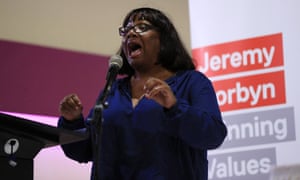Junior doctors planning five-day strikes are not unreasonable, militant or overpaid, despite what government “propaganda” suggests, Labour has said.
Diane Abbott, the shadow health secretary, said it was wrong for ministers to portray junior doctors as the “enemy within”, after they announced plans for their longest walkout yet in a dispute about a new employment contract.
The latest plans have divided the medical community, with the Academy of Medical Royal Colleges expressing disappointment at the British Medical Association’s decision to hold five-day strikes each month for the rest of year.
However, a key group within the academy, the Royal College of Paediatrics and Child Health (RCPCH), has dissented from the statement and condemned the government for imposing new contracts on junior doctors and overstretching the NHS.
Writing for the Guardian, Abbott also backed the struggle of the junior doctors, saying there was a danger that changes to rotas under those contracts would increase the risks to patients, and doctors might end up working even longer hours.
“The government is attempting to portray this entirely as a result of unreasonable, militant or even out of touch and overpaid junior doctors flexing their muscles. Nothing could be further from the truth,” she said.
“In psychology, this is known as projection. They are blaming NHS workers for their own failings. It is the government which is flexing its muscles. It is possible that junior doctors are just the first group of workers who will be targeted for the unreasonable imposition of contracts without negotiation.
“The Tory government is also out of touch with public opinion. Of course, the public dislikes the disruption and may even be fearful of its consequences. But they are clear that the blame for this lies with the government.”

Earlier, Prof Neena Modi, the president of the RCPCH, said the academy was wrong to suggest that junior doctors were compromising patient safety by opting to strike, when the government had imposed “crippling problems” on the NHS.
Speaking on BBC Radio 4’s Today programme, she said: “We felt it was unjust in its implication that junior doctors do not put patient safety first and foremost. I believe junior doctors are always putting patient safety to the forefront of their concern. I know of no instance where any children were harmed during the last strike.”
She said it was the government’s squeeze on spending that was compromising safety. “Children’s preventive healthcare services have borne the brunt of the recent cuts to public health expenditure,” Modi said.
She added: “We have to consider what the junior doctors are saying, [it is] the imposition of the contract which has so dismayed them, it has been predicated on the false grounds that this will in some way provide seven-day NHS services. We are barely managing to provide five-day services at the moment. How, without additional resource … can you suddenly say ‘we will impose a seven-day service, we will impose a new contract on junior doctors’ out of thin air? That doesn’t stack up.”
The academy’s statement said strike action was not proportionate. Modi took issue with the wording. “Is it really proportionate to claim that by imposing the new contract we will suddenly deliver seven-day services?” she said.
Challenged about the potentially debilitating impact of the strikes on patients, Modi said: “We have had crippling problems placed upon the health service, those are debilitating too. Those are extending far beyond five days.”
Modi urged both sides in the dispute to return to the negotiating table. “We, the Royal College of Paediatrics and Child Health, have on several occasions written to the secretary of state for health, asking him, urging him, pleading with him, simply to be magnanimous, to show leadership, to drop the imposition of this contract.”
The academy denied it was split on the issue. A spokesman said: “We have 22 members. The only college that didn’t agree to the statement was the Royal College of Paediatrics and Child Health. The overwhelming majority signed up.”
Nigel Edwards, the chief executive of the Nuffield Trust health thinktank, said junior doctors needed the support of their senior colleagues.
Speaking on Today, he said: “The seniors were very supportive of the junior staff last time and that did make a big difference. It ensured that patients, paradoxically, actually got perhaps superior treatment when they were treated. Whether they will do that this time is open to question. It does seem quite significant that there has been this quite obvious shift in the opinion of the leaders of the medical profession. The academy don’t always find their members necessarily follow them, but they are a very good bellwether for where opinion is.”
Edwards said the strike would pose an added financial burden on NHS trusts because of the number of cancelled operations.
“A bigger, longer-term concern is that it makes quite a big difference to hospitals’ income if they lose this work. And they are all in quite serious financial trouble. Losing three weeks’ worth of planned care income is a big deal, and they may lose access to additional funds that the NHS has put aside to help support the financial position.
“The NHS has got this huge challenge to improve productivity. How does it do that if it doesn’t have the support of some of its key workers?”
Labour defends junior doctors against "militant and overpaid" portrayal
Hiç yorum yok:
Yorum Gönder